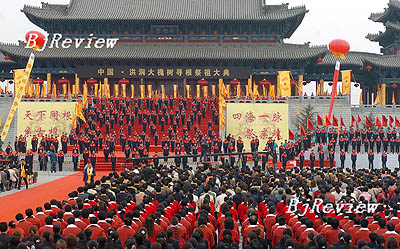|

Change of Attitude Needed
A political advisor at the Chinese People's Political Consultative Conference's Shenzhen Municipal Committee, in south China's Guangdong Province, recently suggested that a new team of urban management police, based on the combination of current patrol police and urban management officers, should be set up to better prevent violence in the process of enforcing laws. This suggestion coincides with Shenzhen Urban Management Bureau's intention to advise the municipal government to carry out a similar plan.
Proponents believe that the violent resistance from unauthorized street traders mainly results from limited power in the hands of urban management officers. If these officers are granted the power and the tools to enforce laws as the police do, they say, the number of conflicts will sharply decline.
The question is, if urban management officers deal with unauthorized street traders in a fair, transparent and moderate way, will we see so many conflicts between the two sides? And of these conflicts, how many result from the traders' deliberate resistance and how many are ignited by urban management officers' inappropriate actions?
After all, most of those unauthorized street traders understand clearly that their businesses are unlawful and would evade urban management officers for fear of possible penalties.
The key is to ensure urban management officers act in strict line with the law. Otherwise, a police uniform can do nothing to help.
Qilu Evening News
When More Is Less
This year marks the first year for the Tomb-sweeping Day to be made a national holiday. On this day, Chinese offer sacrifices to their ancestors, while many local governments organize various memorial ceremonies to show respect to ancestors of the Chinese nation such as Huangdi and ancient iconic cultural figures such as Confucius.
However, this year there appeared a number of luxurious sacrifice rituals. In some cases, different areas competed with each other in terms of the splendor of ceremony, making memorial services overly expensive.
The result is that large investments seldom produce the expected profits and because most of the so-called places of interest are artificial, with little cultural significance, they are actually unable to effectively promote traditional culture.
The luxury and waste in some extravagant sacrifice ceremonies go against the Chinese nation's traditional virtue of thrift, and show the organizers' misunderstanding of the essence of the Tomb-sweeping Day, which is to spread and promote the Chinese nation's virtues, such as frugality, and fine traditional culture.
People's Daily
It's Not Fine
It's recently exposed that the Office for Market Rectification of Linquan County, east China's Anhui Province, bases its staff's salaries on fines collected from local markets.
Fining is actually a means to ensure the enforcement of laws and to protect the public's interests. It's not supposed to be a way for some people to make money. The operation of government agencies should depend on state and local tax revenues, rather than fines. More surprisingly, some leading officials with the Market Rectification Office of Linquan even encouraged their subordinates to increase income through charging fines.
Linquan is not the only case of arbitrary fines. It's an open secret that in some law-enforcement departments, the staff's salaries and bonuses are self-financed and fining gradually becomes compulsory.
When fines become the only income source for the supposed law-enforcement staff, the law is abused, corruption arises and the government image is damaged. If fines continue to be the only source or even a part of relevant officials' incomes, it will become harder to stop arbitrary fining.
Dazhong Daily
Pilots Make Their Point, at Pax Expense
On March 31 and April 1, 21 pilots of China Eastern Airlines, China's third largest carrier, turned their aircraft around in mid-flight and returned to their airport of departure, affecting more than 1,000 passengers in southwest China's Yunnan Province.
In an official apology, China Eastern Airlines explained that the flight reversals were due to bad weather conditions. The announcement triggered public indignation, because flights with other airlines flying the same routes landed on schedule during the same period. Finally, the company admitted on April 8 that some pilots deliberately sabotaged their flight plans.
It's reported that soon after the incident, the Yunnan Branch of China Eastern Airlines reached an agreement with relevant pilots, giving them defaulted housing allowances and various other owed benefits. As a result, the pilots all claimed that it was because of bad weather that they reversed their flights.
Disputes between employees and employers are unavoidable, but the key is passengers should not be held hostage. The airline is a public service provider. The collective move by the pilots shows their indifference toward the public's interests.
Lack of an effective negotiation mechanism between employers and employees and the poor human resource management are both to be blamed. More important is professional ethics.
China Youth Daily | 